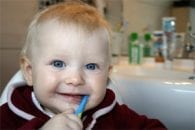“DOES NIGHTTIME BREASTFEEDING CAUSE CAVITIES?”
“My two-year-old has several cavities. The dentist says it is because I am still nursing him, especially at night. Does nighttime breastfeeding cause cavities?”
This is an issue that dentists and breastfeeding advocates still don’t agree on. There is research that supports both sides. Here is my opinion.
1. Most children get at least one cavity. Some children get several. A select few have a genetic susceptibility to have many cavities. These few tend to get cavities no matter what is done to prevent them.
2. Most children breastfeed. Some children continue to breastfeed into their second and third year of life. These children sometimes nurse once or twice a night.
3. Most “night-nursers” are therefore going to have at least one cavity. Some are going to get several cavities, and occasionally the child that has genetically weak teeth, and also happens to be a night-nurser, will get many cavities.
4. So when a night-nurser has a lot of cavities, dentists like to blame this on the sugar in the breast milk that sits on the teeth overnight. What dentists don’t realize, however, is that MOST night-nursers either DON’T get cavities or have only one or two.
5. Some studies have shown that night-nursers don’t have any more cavities than children who are already weaned.
So here is my conclusion – in general, night-nursing does NOT increase the risk of a child getting cavities enough to cause parents to intentionally wean their babies at night. You may have other reasons to do so, but do not wean at night in order to decrease cavities. If your baby night-nurses it is prudent to brush his teeth thoroughly first thing in the morning.
I do, however, have one exception to this. If a one, two or three year old child (or any age) shows signs of unusual tooth decay and numerous cavities, then the parents should do EVERYTHING they can to prevent further decay and cavities. Because there MAY be a slightly increased risk from night-nursing, the parents may need to wean the baby from night-nursing (and by all means, continue during the day as long as you wish).

